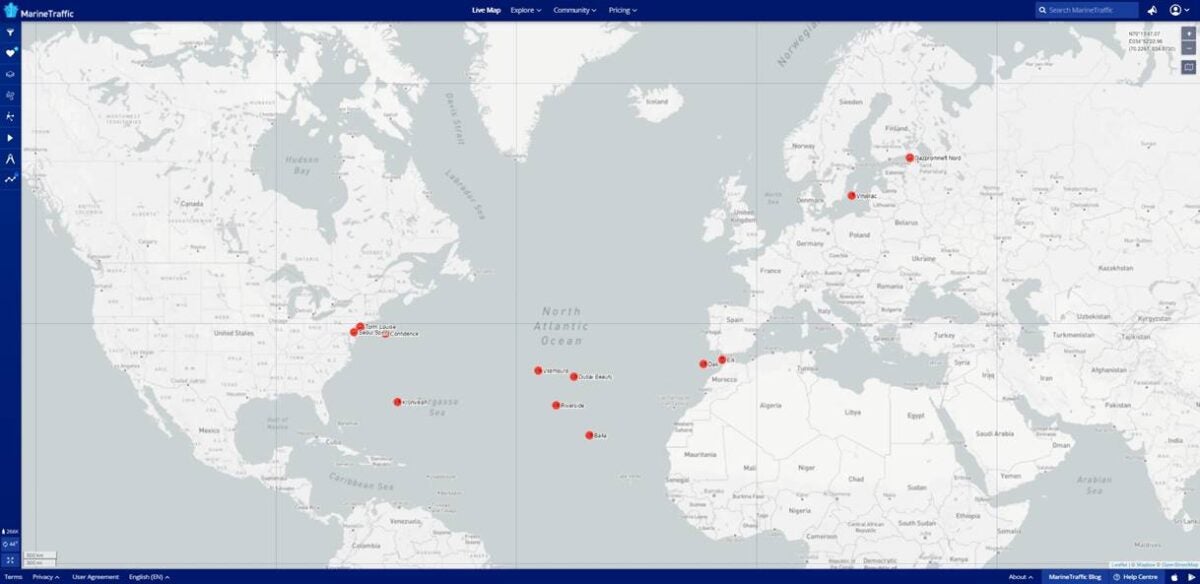After oil companies were given a 45-day window by the Biden administration on Tuesday to phase out existing contracts for Russian oil, at least two tankers were loaded with Russian oil and departed for U.S. destinations, according to information obtained by American Shipper.
MarineTraffic data shows the two tankers as the Vinjerac, which departed Thursday and is headed for the Port of New York & New Jersey for a March 25 arrival, and the Gazpromneft NORD, which loaded on Friday. Its anticipated arrival in the U.S. (port unidentified) is May 16, which is after the window closes and thus could not legally discharge its oil.
MarineTraffic identified 12 tankers in total as part of the “flotilla” traveling with Russian oil to the U.S.
“We can see these tankers are currently traveling at 11-12 knots on average — which is, in general, a normal speed for a commercial tanker on this journey,” said Fotini Tseroni, spokesperson at MarineTraffic.

Two of the tankers have already arrived in the U.S. and were discharging oil — the Tom Louise at the Port of New York & New Jersey, and the Seoul Spirit in Delaware.
Maritime sources tell American Shipper that some of the buyers include Phillips 66; Total’s trading organization, Atlantic Trading and Marketing Inc.; oil trading company Vitol; PBF Energy; and Valero.
While these oil contracts were made prior to Russia’s invasion of Ukraine, they could have been canceled. Also, tanker cargoes can be traded en route, so there is a possibility the Russian oil may not end up in the U.S.
Even after the ships reach the U.S., there is no guarantee they will be able to discharge the Russian oil. The International Longshore and Warehouse Union (ILWU) announced last week that its dockworkers “will not load or unload any Russian cargo coming into or going out of all 29 U.S. West Coast ports.”
“With this action in solidarity with the people of #Ukraine, we send a strong message that we unequivocally condemn the Russian invasion,” said ILWU International President Willie Adams in a Twitter thread.
The tanker ship Balla left Russia on Feb. 21 and is scheduled to arrive at the Port of Los Angeles on April 8.
Still, the possibility of keeping the contracts and taking on Russian oil may force buyers into a potential profits-or-people dilemma. Do companies take on the oil … or do they cancel their contracts and damage their bottom lines? The 45-day window now accelerates the decision-making process.
Recently, Shell faced a backlash after purchasing Russian oil and announced afterward that it would donate profits to humanitarian groups working to help the Ukrainian people.
Meanwhile, there is a growing movement on Capitol Hill targeting big oil’s profits during this war. Sen. Michael Bennet, D-Colo., and 10 other lawmakers are introducing a bill that would tax large corporations quarterly.
Sen. Elizabeth Warren, D-Mass., announced she is throwing her support to the Windfall Profits Tax proposed by fellow Sen. Sheldon Whitehouse’s, D-R.I.
American Shipper reached out to the various oil companies on Friday for response to this dilemma.
A Phillips 66 spokesperson said the company is “fully compliant with all sanctions levied on Russia by the U.S., European Union, United Kingdom and other nations. We are working to ensure security of supply for both our refineries and our customers, all the while abiding by all applicable sanctions.”
The spokesperson said Phillips 66 is donating $1 million to humanitarian relief efforts in Ukraine and added that the company is matching employee contributions to eligible organizations supporting relief efforts.
A Valero spokesperson said the company had “discontinued purchasing Russian oil well before any government sanctions prohibiting Russian petroleum imports were imposed. We are in the process of winding down any pre-invasion purchases and all such cargoes will be in compliance with new government sanctions regulations.”
Other companies have yet to respond.







